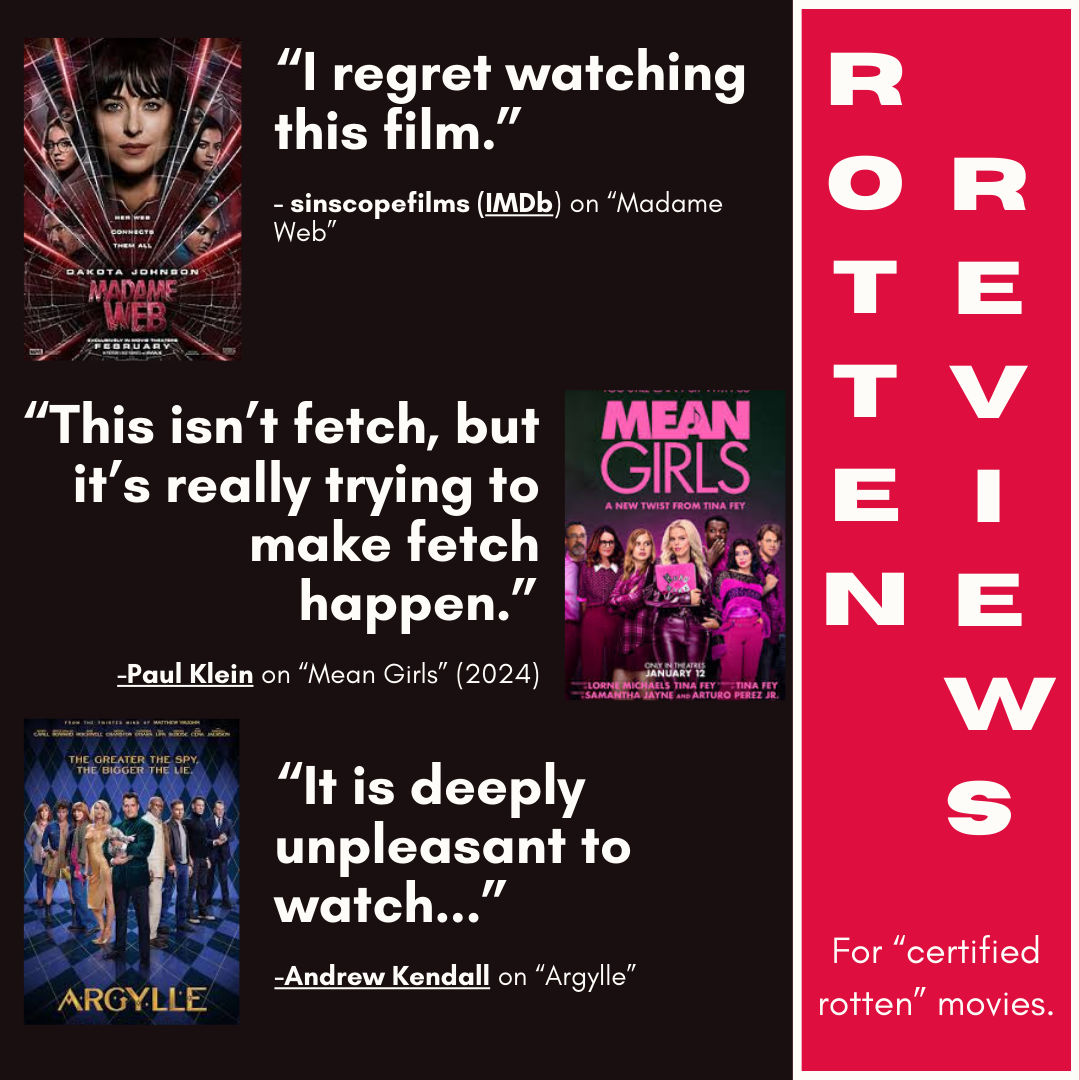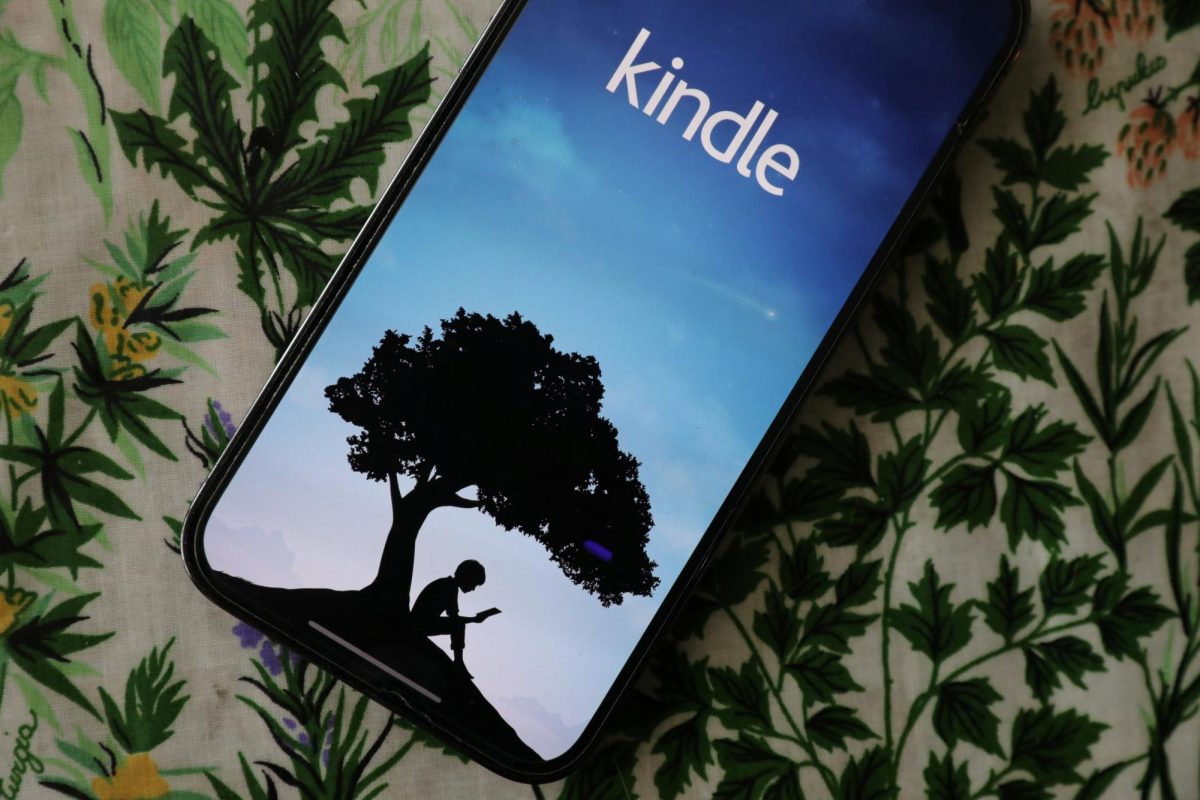Action, horror, romance, thriller and comedy. No genre seems to be safe in 2024.
“Madame Web,” the Marvel-Sony superhero movie featuring Sydney Sweeney and Dakota Johnson, made only $43.82 million at the box office, compared to its $80 million budget. Its debut on Rotten Tomatoes was a crushing 13 percent (critic certified rotten), and its rating on IMDb only made it to a four out of 10.
“Lisa Frankenstein,” a horror-rom-com hybrid starring Cole Sprouse and Kathryn Newton, raked in $9.77 million, a far cry from its estimated budget of $13 million. Its Rotten Tomato score stands at 52 percent, with its IMDb at 6.1 out of 10.
“Argylle,” the action-comedy that strangely included pop star Dua Lipa in its cast list, had a reported budget of $200 million, and only managed to pull in $96.2 million. Its semi-stacked cast (with Samuel L. Jackson and Henry Cavill) didn’t do much to soften the blow from reviewers; a 33 percent from Rotten Tomatoes and a 5.7 out of 10 from IMDb.
“Mean Girls” (the musical reboot) got 69 percent on Rotten Tomatoes, and 5.6 on IMDb. “Imaginary” (horror) was awarded a scathing 24 percent from Rotten Tomatoes and a 4.7 on IMDb. “The Watchers” (horror/fantasy) scored 32 percent (Rotten Tomatoes) and a 5.7 from IMDb.
And that’s just a few of the many disappointments that the film industry has gifted us in 2024.
While the claim can be made that this “flop era” in film is due to the combined force of the COVID-19 pandemic of 2020 and the writers’ strikes of 2023, that’s only a small part of the issue. Afterall, you can’t blame bad reviews on a virus.
A common theme between the majority of movies in 2024 is simply shoddy craftsmanship. The stars of “Madame Web” couldn’t even properly advertise for the film because they also thought it was awful. “Argylle” was called a “colossal waste of talent and precious time” by Rolling Stone. And “The Watchers” was stated as, “A below average horror film from someone I expected more from” by Rotten Tomatoes.
Why are these movies so awful? To put it bluntly, they lack any type of meaning or depth. And it’s becoming painfully obvious to audiences that what they’re getting instead of these things is nothing more than a pathetic money grab.
Movie studios can blame the drop in ratings on the pandemic and the strikes all they want, but that won’t change the bad taste they’ve put in people’s mouths. Companies like Marvel, Disney and Sony are accustomed to being capable of doing no wrong, so this disillusionment of audiences is a wake up call to what they’ve been letting slide.
And, in the end, that’s what the entire problem comes down to: they don’t care. It’s a classic case of quantity over quality, and when it comes to any type of art, that’s a no-go. When actors, producers and anyone else involved can’t take their own work seriously, it doesn’t just ruin their movie, it sets a precedent for the whole industry. It turns film, something that should be an impressive artform, into a joke.
Movies should not be about squeezing every ounce of nostalgia from a popular character or continuing a series via reboot. Audiences shouldn’t have to sit through sequel after sequel, praying that at some point one is half as good as the original. A fan shouldn’t grimace upon hearing their favorite movie is getting a “number two” or even a “number zero.” They shouldn’t have to live in fear that Marvel or DC or Sony or Disney is going to ruin their favorite character. Whether that be by sloppily bringing them back from the dead, or by incorporating a copy-and-paste girlboss archetype into their story.
Still, the bad movies aren’t the only evidence that the movie industry needs to take a serious look at itself. There is also a clear correlation between the success stories of the 2024 box office.
Marvel’s “Deadpool and Wolverine,” Warner Brothers’ “Dune: Part Two,” Disney’s “Inside Out 2,” and, most recently, Warner’s “Beetlejuice Beetlejuice” are all on the list of best-rated movies of the year. They are also all later installments of already popular films. “Deadpool and Wolverine” is the third “Deadpool” movie, while the others are the second of their franchise.
Yes, they’re all good movies, but I can’t even give them that much credit because they were supposed to be. Of course, the third “Deadpool” was a hit, so were the first two. People shouldn’t be leaving theaters after these movies feeling pleasantly surprised that it wasn’t a flop, it shouldn’t be a surprise at all! These films are coming from studios that have left audiences awestruck for generations, good quality is a given. Or, at least, it should be.
Unfortunately, until the film industry starts taking itself seriously again, neither quality nor quantity is guaranteed. The thirst for money within the industry seems far greater than the desire to create meaningful art, and they only have themselves to blame.
Reviews from photo: sinscopefilms on IMDb, Paul Klein, Andrew Kendall









